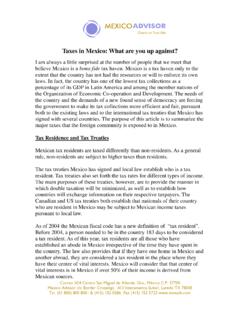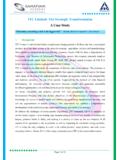Transcription of 2018 Instructions for Form 8854
1 Userid: CPMS chema: instrxLeadpct: 100%Pt. size: Draft Ok to PrintAH XSL/XMLF ileid: .. ions/I8854/2017/A/XML/Cycle09/source(Ini t. & Date) _____Page 1 of 10 8:38 - 20-Nov-2017 The type and rule above prints on all proofs including departmental reproduction proofs. MUST be removed before for Form 8854 Initial and Annual Expatriation StatementDepartment of the TreasuryInternal Revenue ServiceSection references are to the Internal Revenue Code unless otherwise DevelopmentsFor the latest information about developments related to Form 8854 and its Instructions , such as legislation enacted after they were published, go to InstructionsPurpose of FormExpatriation tax provisions apply to citizens who have relinquished their citizenship and long-term residents who have ended their residency (expatriated). Form 8854 is used by individuals who have expatriated on or after June 4, date on which you are considered to have expatriated determines which Parts of the form you must complete.
2 You are considered to have expatriated on the date you relinquished your citizenship (in the case of a former citizen) or terminated your long-term residency status (in the case of a former resident). If you expatriated after June 3, 2004, and before June 17, 2008, see the relevant section under General Instructions and complete Parts I, II, and V. If you expatriated after June 16, 2008, and before January 1, 2017, see the relevant section under General Instructions and complete Parts I and III. If you expatriated in 2017, complete Parts I, IV, and Expatriation includes the acts of relinquishing citizenship and terminating long-term of relinquishment of citizenship. You are considered to have relinquished your citizenship on the earliest of the following date you renounced your citizenship before a diplomatic or consular officer of the United States (provided that the voluntary renouncement was later confirmed by the issuance of a certificate of loss of nationality).
3 Date you furnished to the State Department a signed statement of your voluntary relinquishment of a nationality confirming the performance of an expatriating act (provided that the voluntary relinquishment was later confirmed by the issuance of a certificate of loss of nationality). date the State Department issued a certificate of loss of date a court canceled your certificate of of termination of long-term residency. If you were a long-term resident (LTR), you terminated your lawful permanent residency on the earliest of the following date you voluntarily abandoned your lawful permanent resident status by filing Department of Homeland Security Form I-407 with a consular or immigration date you became subject to a final administrative order that you abandoned your lawful permanent resident status (or, if such order has been appealed, the date of a final judicial order issued in connection with such administrative order).
4 Date you became subject to a final administrative or judicial order for your removal from the United States under the Immigration and Nationality you were a dual resident of the United States and a country with which the United States has an income tax treaty, the date you commenced to be treated as a resident of that country and you determined that, for purposes of the treaty, you are a resident of the treaty country and gave notice to the Secretary of such treatment on a Form 8833 attached to a timely filed income tax return. See Regulations section (b)-7 for information on other filing requirements if you are such an resident (LTR) defined. You are an LTR if you were a lawful permanent resident of the United States in at least 8 of the last 15 tax years ending with the year your status as an LTR ends. In determining if you meet the 8-year requirement, don't count any year that you were treated as a resident of a foreign country under a tax treaty and didn't waive treaty benefits applicable to residents of the permanent resident.
5 You are a lawful permanent resident of the United States if you have been given the privilege, according to immigration laws, of residing permanently in the United States as an immigrant. You generally have this status if you have been issued an alien registration card, also known as a green card, and your green card hasn't been revoked or judicially or administratively determined to have been abandoned, and you haven't commenced to be treated as a resident of a foreign country under a tax treaty between the United States and such foreign country. You aren t treated as a lawful permanent resident if you commenced to be treated as a resident of a foreign country under a tax treaty, didn t waive the benefits of such treaty applicable to foreign residents, and notified the IRS of such a position on a Form 8833 attached to a timely filed income tax return. If you were already an LTR at the time you commence to be treated as a resident of such foreign treaty country, then you will be treated as having expatriated as of that AfterJune 3, 2004, andBefore June 17, 2008 The rules in this section apply to persons who are considered to have expatriated after June 3, 2004, and before June 17, of Tax ExpatriationFor purposes of filling out Part I, the date of your expatriation is the later of the date you notified the relevant agency of your expatriating act or the date Form 8854 was first filed in accordance with these Instructions .
6 Apply the rules of section 7502 to determine the date on which this form is filed. Generally, the postmark date is the filing you file Form 8854 and notify the Department of State or the Department of Homeland Security of your expatriating act, your expatriation for immigration purposes CAUTION!Nov 20, 2017 Cat. No. 24874 EPage 2 of 10 Fileid: .. ions/I8854/2017/A/XML/Cycle09/source8:38 - 20-Nov-2017 The type and rule above prints on all proofs including departmental reproduction proofs. MUST be removed before not relieve you of your obligation to file tax returns and report your worldwide income as a citizen or resident of the United Must FileYou must file Form 8854 to:Establish that you have expatriated for tax purposes; orComply with the annual information reporting requirements of section 6039G, if you are subject to tax under section If you were a naturalized citizen, but lost your citizenship because a federal court revoked your naturalization under section 340 of the Immigration and Nationality Act, you don't need to complete this form if, after the revocation, you hold the status under the Immigration and Nationality Act of an alien lawfully admitted for permanent residence.
7 You must complete this form, however, if you were a naturalized citizen and you gave up your citizenship by expatriation under section 349 of the Immigration and Nationality Under Section 877 You are subject to taxation under section 877 if, within the 10-year period immediately preceding 2017, you lost your citizenship or you were an LTR who ceased to be a lawful permanent resident and any one of the following applies to average annual net income tax liability for the 5 tax years ending before the date of your expatriation is more than the amount listed $124,000 if you expatriated in $127,000 if you expatriated in $131,000 if you expatriated in $136,000 if you expatriated in $139,000 if you expatriated in net worth is $2 million or more on the date of your fail to certify on Form 8854 that you have complied with all of your federal tax obligations for the 5 tax years preceding the date of your you are subject to tax under section 877, you are no longer taxed as a citizen or resident on your worldwide income.
8 However, you must compute your tax as a nonresident according to the special rules of section 877. These rules expand the categories of income and gain on which you owe tax. You are also subject to special rules for gift and estate tax purposes that differ from those applicable to other nonresident consequences of presence in the United States after expatriation. If, for any tax year during the 10-year period in which you are otherwise subject to section 877, you are present in the United States for more than 30 days in a calendar year ending in such tax year, you will be treated as a citizen or resident for that tax year. You will be subject to tax on your worldwide income unless the following exception You can be present in the United States for up to 60 days without being treated as a citizen or resident if you are performing personal services in the United States for an employer who isn't related (within the meaning of sections 267 and 707) to you and you meet either of the following were a citizen and, within a reasonable period following your expatriation, you became a citizen or resident fully liable to tax in the country in which you, your spouse, or either of your parents was born; orFor each year in the 10-year period ending on the date of expatriation, you were physically present in the United States for 30 days or Pub.
9 519 for details about what constitutes a day of presence in the United To FileIf you expatriated after June 3, 2004, and before June 17, 2008, you should have filed your initial Form 8854 as soon as possible after the date you lost your citizenship or you terminated your LTR status. Otherwise, you remain subject to tax as a citizen or resident until you both (a) file your initial Form 8854, and (b) notify the appropriate authorities of your expatriating act. See the Caution under Date of Tax Expatriation, filing your initial Form 8854, if you re required to file Form 8854 annually because you are subject to tax under 877, file your annual Form 8854 by the due date for filing Form 1040NR regardless of whether you are required to file Form 1040NR. If you are required to file Form 1040NR, attach Form 8854 to your Form 1040NR and file your Form 1040NR at the address in the Instructions for Form 1040NR.
10 Also send a copy of Form 8854 to the address under Where To File below. If you aren't required to file Form 1040NR, send your Form 8854 to the address under Where To File you are present in the United States following your expatriation and are subject to tax as a citizen or resident under the rules described in Exception, earlier, file Form 8854 with your Form 1040 by the due date for filing Form 1040. Also send a copy of Form 8854 to the address under Where To File below by the due date for filing Form To FileSend your Form 8854 (or a copy of your Form 8854 if you are required to attach the original to a Form 1040NR or a Form 1040) to this of the TreasuryInternal Revenue ServicePhiladelphia, PA 19255-0049 Expatriation AfterJune 16, 2008 The rules in this section apply to persons who are considered to have expatriated after June 16, Must FileYou must file your initial Form 8854 if you relinquished your citizenship or you are an LTR and terminated your residency must file your annual Form 8854 if you expatriated before 2017 and the payment of tax, an item of eligible deferred compensation, an interest in a nongrantor expatriate.












